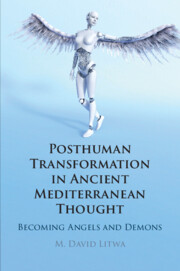Book contents
- Posthuman Transformation in Ancient Mediterranean Thought
- Posthuman Transformation in Ancient Mediterranean Thought
- Copyright page
- Epigraph
- Dedication
- Contents
- Acknowledgments
- Abbreviations
- Introduction
- Chapter 1 Hesiod and Daimonification in the Archaic and Classical Periods
- Chapter 2 Empedocles as Daimon
- Chapter 3 Plato and the Moralization of Daimonification
- Chapter 4 Daimonification in Xenocrates, Plutarch, Apuleius, and Maximus of Tyre
- Chapter 5 Moses Angelified in Philo of Alexandria
- Chapter 6 Origen, Angelification, and the Angelified Jesus
- Chapter 7 Plotinus as a Living Daimon
- Chapter 8 The Angelification of Zostrianos
- Conclusion
- Select Bibliography
- Index
Conclusion
Advent or Apocalypse?
Published online by Cambridge University Press: 24 December 2020
- Posthuman Transformation in Ancient Mediterranean Thought
- Posthuman Transformation in Ancient Mediterranean Thought
- Copyright page
- Epigraph
- Dedication
- Contents
- Acknowledgments
- Abbreviations
- Introduction
- Chapter 1 Hesiod and Daimonification in the Archaic and Classical Periods
- Chapter 2 Empedocles as Daimon
- Chapter 3 Plato and the Moralization of Daimonification
- Chapter 4 Daimonification in Xenocrates, Plutarch, Apuleius, and Maximus of Tyre
- Chapter 5 Moses Angelified in Philo of Alexandria
- Chapter 6 Origen, Angelification, and the Angelified Jesus
- Chapter 7 Plotinus as a Living Daimon
- Chapter 8 The Angelification of Zostrianos
- Conclusion
- Select Bibliography
- Index
Summary
The conclusion sums up the work, indicating the core elements shared by (Hellenic) theories of daimonification along with (Jewish and Christian) theories of angelification. One common element is the link of virtue (ethical transformation) with physical and cognitive transformation. It is this persistent link that allows ancient theories of posthuman transformation to serve as correctives for current Transhumanist visions of posthuman enhancement. Transhumanists often speak of cognitive and physical improvements with no robust reflection on ethical or moral improvement. Posthuman enhancement must never be defined apart from morality, but in terms of it. Morality cannot simply be programmed from without, nor can it be governed by the overall value of personal autonomy.
- Type
- Chapter
- Information
- Posthuman Transformation in Ancient Mediterranean ThoughtBecoming Angels and Demons, pp. 151 - 165Publisher: Cambridge University PressPrint publication year: 2021

